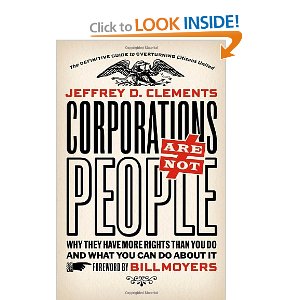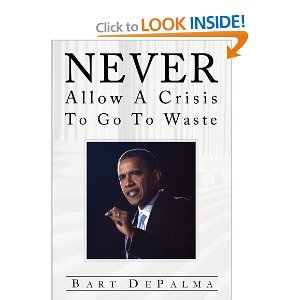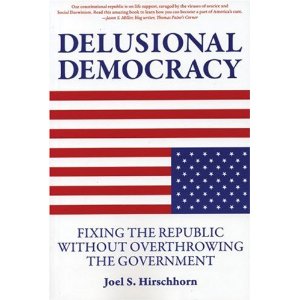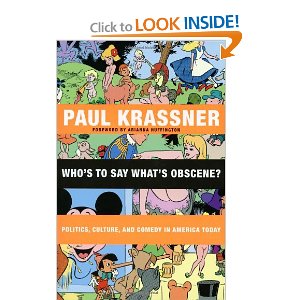
Jeffrey D. Clements
5.0 out of 5 stars It's Worse Than We Thought But More Easily Fixed Than We Imagined,January 8, 2012
David C N Swanson (Charlottesville VA United States) – See all my reviews<
This book should mainstream the campaign to end corporate personhood.
Clements traces the development of the legal doctrine of corporate personhood back long before the Supreme Court's Citizens United decision two years ago this month, in particular to President Richard Nixon's appointment of Lewis Powell to the Supreme Court in 1972. Led by Powell's radical new conception of corporate rights, Clements shows, the court began striking down laws that protected living breathing persons' rights in areas including the environment, tobacco, public health, food, drugs, financial regulation, and elections.
In 1978 the Supreme Court ruled that corporations had speech rights that prevented banning their money from an election, a conclusion that might have been nearly incomprehensible a decade earlier before the U.S. Chamber of Commerce and various corporate foundations began filling our public discourse with phrases like “corporate speech.” In 1980 Congress forbade the Federal Trade Commission from protecting children or students from junk food advertising and sales. In 1982 corporate speech rights in the U.S. Supreme Court overturned a state law that had attempted to block energy companies from promoting greater energy consumption. In the 1990s, the Monsanto corporation, whose genetically engineered drug was banned in many countries, won the right to include it in milk in the United States and the “right not to speak,” thereby overturning a law requiring that milk be labeled to indicate the drug's presence.
Decision after decision has extended corporate rights to a position of priority over actual human rights on everything from food and water and air to education and healthcare and wars. The ground has shifted. In 1971 Lewis Powell argued on behalf of the cigarette companies that they had a corporate person's right to use cartoons and misleading claims to get young people hooked on nicotine, and he was laughed out of court. In 2001, the Supreme Court struck down a state law banning cigarette ads within 1,000 feet of schools and playgrounds. The reason? The sacred right of the corporate person, which carries more weight now than the rights of the people of a community to protect their children … er, excuse me, their “replacement smokers.”
And why do corporate rights carry so much weight? One reason is that, as Clements documents and explains, “transnational corporations now dominate our government” through election spending. This is why a civilized single-payer health coverage system like those found in the rest of the wealthy nations of the world is not “practical.” This is why cutting military spending back to 2007 levels would mean “amageddon” even though in 2007 it didn't. This is why our government hands oil corporations not only wars and highways but also massive amounts of good old money. This is why we cannot protect our mountains or streams but can go to extraordinary lengths to protect our investment bankers.
“Since the Citizens United decision in 2010,” Clements writes, “hundreds of business leaders have condemned the decision and have joined the work for a constitutional amendment to overturn expanded corporate rights.” You might not learn this from the corporate media, but there is a widespread and growing mainstream understanding that abuse by oversized mega-corporations has been disastrous for ordinary businesses as well as communities, families, and individuals. Clements' turns out to be a pro-business, albeit anti-U.S. Chamber of Commerce, book.
And what can be done? We can build an independent, principled, and relentless Occupy movement and include as a central demand the amending of the U.S. Constitution to end corporate personhood. Clements' book offers a draft amendment, a sample resolution, a collection of frequently asked questions (and answers), a list of organizations, websites, resources, books, and campaigns.
This is doable, and it is what we should do this election year so that in future election years we might actually have elections.








